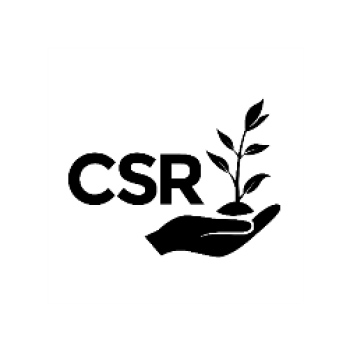Corporate social responsibility (“CSR”) has become an essential and increasingly public part of a company’s business strategy for long-term success. A company’s CSR strategy reflects its approach to operating the business while considering its impact on society, including its social, economic, and environmental impact. CSR may be motivated by a business’s desire to be a good corporate citizen, but today, it is also being demanded by customers, shareholders, and employees. According to the 2018 Cone/Porter Novelli Purpose Study, 78% of Americans believe companies must do more than just make money; they must also positively impact society. BlackRock CEO Larry Fink’s 2019 annual letter to CEOs highlighted the shift in employees’ expectations of their employer: “In a recent survey by Deloitte, millennial workers were asked what the primary purpose of businesses should be – 63 percent more of them said ‘improving society’ than said ‘generating profit.’” Because of these changing expectations, he noted that, “[a]s wealth shifts and investing preferences change, environmental, social, and governance issues will be increasingly material to corporate valuations.”
Layered on top of these market drivers are journalists and the media, who investigate and report on specific instances of harmful business practices by companies and entire industries. Athletic gear company, Nike, experienced a major public scandal in the 1990s when media reports revealed abusive labor practices at factories contracted to produce Nike apparel. Nike began conducting factory audits in the early 2000s, and published a detailed report of its findings. Nike has publicly acknowledged its past failures and now publicizes their ongoing commitments, standards, and audit data as part of the company’s CSR reports.
But do CSR efforts actually pay off? A recent research study looked at the impact of linking executive compensation to CSR criteria (known as “CSR contracting”) among all S&P 500 companies and found that this practice led to an increased long-term orientation, an increase in firm value[1], and an increase in social and environmental initiatives. On average, CSR contracting also led to companies cutting emissions by nearly nine percent, increasing green patents by three percent, and receiving a five percent higher CSR rating. These findings demonstrate that CSR efforts do, in fact, benefit society while strengthening firm value.
A company’s CSR strategy should not be equated with its corporate philanthropy or giving program. Corporate philanthropy focuses on charitable contributions, through donations of money, goods and services, as well as employee volunteer time, however, it does not generally change how a company — at its core — does business. CSR, by contrast, affects a broader group of stakeholders through the actual operation of the business, including customers, employees, shareholders, communities, and the environment. Yet it’s not just for-profit businesses that drive CSR; the nonprofit sector plays a vital role in CSR implementation. Given that nonprofits are, by their nature, exclusively dedicated to promoting and supporting charitable and educational objectives, including publicly beneficial social, economic, and environmental objectives, it should come as no surprise that nonprofits often play an integral role in driving CSR strategies. At the same time, the tax-exempt status of nonprofits creates certain constraints on how they can support businesses as they move towards practices that are more socially and environmentally responsible. As such, knowledgeable legal counsel can help ensure a successful collaboration. This article highlights three different roles nonprofits play in helping companies achieve their CSR goals, and highlights the legal structures and parameters in which they operate.
- Advancement of Ethical and Responsible Business Practices
The most recognized CSR strategy involves the advancement of ethical and sustainable business practices. This includes a company’s business practices with respect to the environment, labor practices and human rights, business ethics, and supply chain management. A few legislative efforts have been undertaken to push companies towards more socially responsible business practices, including the United Kingdom Modern Slavery Act 2015 and the California Transparency in Supply Chains Act of 2010 (and similar laws are being considered in Australia and Hong Kong). These laws require large retailers and manufacturers to disclose on their website their voluntary efforts taken to eradicate slavery and human trafficking in their supply chains. Unfortunately, companies can comply with these laws by simply stating that they do not undertake any verification, audits, certification, internal accountability, and training in order to mitigate the risk of human trafficking and slavery. As such, many believe these legislative efforts are insufficient to achieve their otherwise laudable goals.
By contrast, nonprofits are helping companies improve their business practices by articulating clear, objective standards for ethical and sustainable business practices, and conducting independent assessments of company practices against those standards. Consider the well-established LEED (Leadership in Energy and Environmental Design) green building rating system for building design, construction, operations and maintenance. The LEED certification standards were established, and are maintained, by the U.S. Green Building Council, a 501(c)(3) tax-exempt organization. A separate but related entity, Green Business Certification, Inc., a 501(c)(6) tax-exempt organization, administers the LEED certification program, performing third-party technical reviews and verification of LEED-registered projects. Other well-known certification or verification programs operated by nonprofits include Fair Trade Certified, CDP (carbon footprint disclosure); The Non-GMO Project (non-GMO food supply), and Marine Stewardship Council (sustainable seafood certification). Another nonprofit, Verité, whose mission is to provide the knowledge and tools to eliminate serious labor and human rights abuses in global supply chains, provides assessments and training that focus on safe, fair, and legal working conditions for workers within business supply chains.
501(c)(3) tax-exempt nonprofits are viewed as trustworthy administrators of third party standards for ethical and sustainable business practices thanks to their legal DNA – U.S. tax-exempt nonprofits are organized (and must be operated) to further charitable and educational purposes, not for private benefit. As such, they are prohibited from using their income or earnings to benefit private interests. Nonprofits can advocate for business practices that minimize harm to people or the environment, but only within the constraints imposed by IRS regulations.
- Sustainability Reporting and Company-Wide Assessments
As companies work to advance ethical and responsible business practices, they also want to share successes publicly with their stakeholders, but because CSR reporting is purely voluntary, how do we know if companies are truly being good corporate citizens? A global nonprofit, Global Reporting Initiative (“GRI”), pioneered sustainability reporting in 1997, and today, they are the most widely adopted global standards for sustainability reporting. Sustainability reporting is critical to providing transparency, and therefore public accountability. Sustainability reporting helps companies measure, understand, and communicate their economic, environmental, social and governance (“ESG”) performance. The reports also help companies set goals to continue improving their sustainability practices across economic, environmental, and social impact standards.
While organizations like GRI are creating uniform standards for reporting across ESG standards, other organizations like U.S.-based nonprofit B Lab, require a business to undergo an actual assessment of how significant a company’s current impact is across social impact areas. Certified B Corporations must achieve a minimum verified score on B Labs’ B Impact Assessment—a rigorous evaluation of a company’s impact on its workers, customers, community, and environment—and make their assessment transparent on bcorporation.net. [Disclosure: Perlman & Perlman, LLP is a Certified B Corp.] Athleta, a wholly-owned subsidiary of Gap, recently obtained B Corp certification. According to Athleta’s press release announcing its B Corp certification, 40% of Athleta apparel is made of recycled and sustainable materials, and they are on track to meet their goal of 80% by 2020.
Some nonprofits are not waiting for companies to opt in to being assessed against their standards, and are instead publishing reports based on publicly available information. Environmental Working Group has been doing this for years at the product level through its Skin Deep Cosmetics Database, which combines product ingredient lists with information from more than 60 toxicity and regulatory databases to provide safety ratings for tens of thousands of personal care products. At the company-wide level, Know the Chain is helping companies and investors to understand and address forced labor risks within their global supply chains. Formed in 2013 by nonprofit, Humanity United (which is part of the Omidyar Group), Know the Chain was originally established with the goal of documenting compliance with the California Supply Chain Transparency Act. Today, Know the Chain focuses on benchmarking current corporate practices across key sectors where forced labor is particularly acute, including information & communications technology, food & beverage, and apparel and footwear, with the goal of driving corporate action while also informing investor decisions. The benchmarks are based on the disclosures of policies and practices used by select large companies. Know the Chain aims to use data and market forces to drive a “race to the top” that creates “brand reward for leaders and brand risk for laggards,” and ultimately encourages companies to adopt standards and practices that protect worker’s well-being.
- Building Charitable Giving Into the Business Model
While sustainability reporting and assessments focus primarily on business operations, a growing number of companies have built corporate citizenship directly into their core retail sales and marketing strategy. TOMS became popular because of its “Buy One, Give One” business model, donating a pair of shoes to a person in need for every pair sold, distributed through its partnerships with global humanitarian organizations. On May 7th, TOMS announced a major overhaul of its giving model. Based on the premise that the problems facing our world today are more complex than ever, TOMs has decided that, in addition to providing for basic human needs including shoes and clean water, TOMS is asking customers to join them in “taking a stand” on critical issues. As such, when you purchase a TOMS product, you can also pick an issue area that you stand for, such as ending gun violence, equality, mental health, or homelessness, and your purchase helps direct TOM’s giving (carried out in the form of impact grants that support sustainable and innovative strategies and solutions on leading social issues).
Food product company, Newman’s Own, recognized by its tagline, “All Profits to Charity,” has charitable giving embedded into its ownership structure — 100% of the business is owned by Newman’s Own Foundation. Newman’s Own Foundation, whose mission is “to use the power of giving to help transform lives and nourish the common good,” uses the profits to support a variety of charitable organizations. Newman’s Own’s ownership structure is supported by legislation enacted in February 2018 that allows 501(c)(3) tax-exempt private foundations to own 100% of a business under certain conditions. The foundation is now working to promote the “all profits to charity” concept by providing resources and support to other companies that have committed to donating all of their profits to charity.
A more widely adopted model of giving, albeit less deeply embedded in a company’s business structure or strategy, involves entering into a formal commitment to give a portion of company profits to charitable causes. One of the biggest advocates of this model is 1% for the Planet, a 501(c)(3) tax-exempt public charity that encourages businesses to commit to donating 1% of total sales across the company’s operations to support environmental causes. The organization’s 1200+ members, which includes environmentally conscious brands like Patagonia, give directly to approved nonprofits, and 1% for the Planet provides third party certification of their fulfillment of this giving commitment. They also help companies identify environmental organizations that will make the greatest impact and align with corporate giving goals. In exchange for upholding this giving commitment, members receive the right to use the 1% for the Planet logo in their marketing.
Companies looking to push their CSR efforts to the next level should be aware of the unique resources available through the nonprofit sector to help them establish and achieve corporate social impact goals. Similarly, nonprofits cannot ignore the significant effect that businesses have on the social and environmental issues they were created to address, and should consider ways they can help companies improve their impact on those issues. Given the strong consumer, investor, and employee demand for corporate social responsibility, there is no better time for companies and nonprofits to work together to help businesses operate more sustainably and responsibly.
[1] The study uses Tobin’s Q to determine firm value, and is a ratio of the market value of total assets to the book value of total assets.
-
Karen l. Wuhttps://www.staging-perlmanandperlman.com/author/karenwu/
-
Karen l. Wuhttps://www.staging-perlmanandperlman.com/author/karenwu/
-
Karen l. Wuhttps://www.staging-perlmanandperlman.com/author/karenwu/
-
Karen l. Wuhttps://www.staging-perlmanandperlman.com/author/karenwu/











